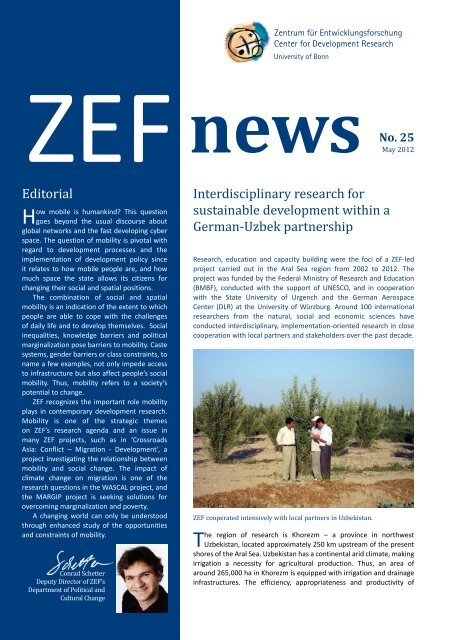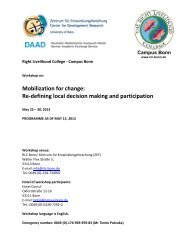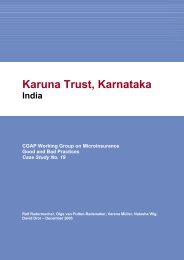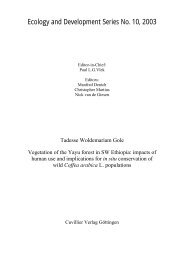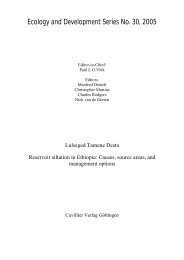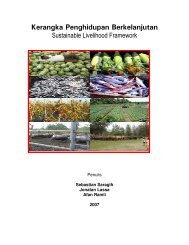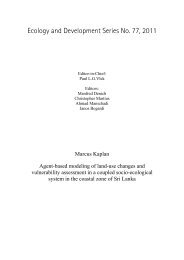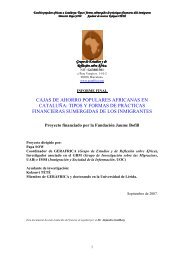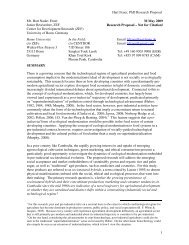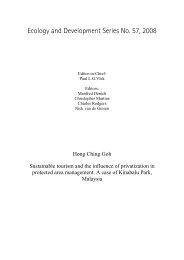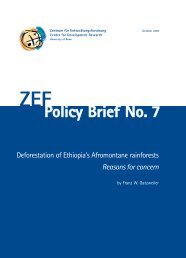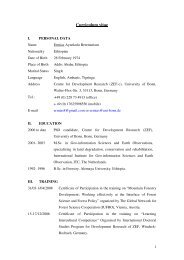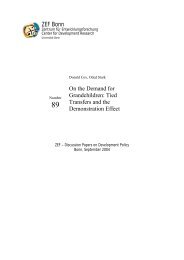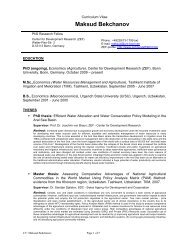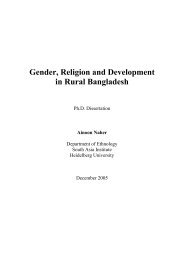You also want an ePaper? Increase the reach of your titles
YUMPU automatically turns print PDFs into web optimized ePapers that Google loves.
<strong>ZEF</strong><br />
Editorial<br />
How mobile is humankind? This question<br />
goes beyond the usual discourse about<br />
global networks and the fast developing cyber<br />
space. The question of mobility is pivotal with<br />
regard to development processes and the<br />
implementation of development policy since<br />
it relates to how mobile people are, and how<br />
much space the state allows its citizens for<br />
changing their social and spatial positions.<br />
The combination of social and spatial<br />
mobility is an indication of the extent to which<br />
people are able to cope with the challenges<br />
of daily life and to develop themselves. Social<br />
inequalities, knowledge barriers and political<br />
marginalization pose barriers to mobility. Caste<br />
systems, gender barriers or class constraints, to<br />
name a few examples, not only impede access<br />
to infrastructure but also affect people’s social<br />
mobility. Thus, mobility refers to a society’s<br />
potential to change.<br />
<strong>ZEF</strong> recognizes the important role mobility<br />
plays in contemporary development research.<br />
Mobility is one of the strategic themes<br />
on <strong>ZEF</strong>’s research agenda and an issue in<br />
many <strong>ZEF</strong> projects, such as in ‘Crossroads<br />
Asia: Conflict – Migration - Development’, a<br />
project investigating the relationship between<br />
mobility and social change. The impact of<br />
climate change on migration is one of the<br />
research questions in the WASCAL project, and<br />
the MARGIP project is seeking solutions for<br />
overcoming marginalization and poverty.<br />
A changing world can only be understood<br />
through enhanced study of the opportunities<br />
and constraints of mobility.<br />
Conrad Schetter<br />
Deputy Director of <strong>ZEF</strong>’s<br />
Department of Political and<br />
Cultural Change<br />
<strong>news</strong><br />
Interdisciplinary research for<br />
sustainable development within a<br />
German-Uzbek partnership<br />
Research, education and capacity building were the foci of a <strong>ZEF</strong>-led<br />
project carried out in the Aral Sea region from 2002 to 2012. The<br />
project was funded by the Federal Ministry of Research and Education<br />
(BMBF), conducted with the support of UNESCO, and in cooperation<br />
with the State University of Urgench and the German Aerospace<br />
Center (DLR) at the University of Würzburg. Around 100 international<br />
researchers from the natural, social and economic sciences have<br />
conducted interdisciplinary, implementation-oriented research in close<br />
cooperation with local partners and stakeholders over the past decade.<br />
<strong>ZEF</strong> cooperated intensively with local partners in Uzbekistan.<br />
The region of research is Khorezm – a province in northwest<br />
Uzbekistan, located approximately 250 km upstream of the present<br />
shores of the Aral Sea. Uzbekistan has a continental arid climate, making<br />
irrigation a necessity for agricultural production. Thus, an area of<br />
around 265,000 ha in Khorezm is equipped with irrigation and drainage<br />
infrastructures. The efficiency, appropriateness and productivity of<br />
1<br />
No. 25<br />
May 2012<br />
<strong>ZEF</strong><strong>news</strong> No. 25
water and land resources in the region are poor. The<br />
governance system in Uzbekistan is still state-centric, and<br />
cotton and wheat production are under a state-quota<br />
system. Unemployment and poverty rates among the<br />
population are high.<br />
Objectives and approach<br />
Agriculture in Khorzem has been the main economic<br />
activity and provided a decent livelihood for the population<br />
for centuries – due to adequate irrigation. However, under<br />
Soviet rule the irrigation system was scaled-up to an<br />
extent that triggered the environmental and economic<br />
problems the region faces today. After obtaining national<br />
independence in 1991, Uzbekistan not only inherited<br />
these problems, but they have even intensified due to the<br />
side-effects of the economic transition process.<br />
The overarching aim of the <strong>ZEF</strong>-led project in Khorezm<br />
was to devise sustainable development options for land<br />
and water use by generating ecologically and economically<br />
sound practices. The goal was to increase land and<br />
water use efficiency, combat land degradation, mitigate<br />
greenhouse gas emissions, and increase rural incomes.<br />
It was clear from the beginning that an interdisciplinary<br />
concept combining natural and human sciences was<br />
needed to understand the multi-layered problems in the<br />
region, which are caused by a diverse and interdependent<br />
mix of technical, institutional and socio-economic issues.<br />
In addition, trans-disciplinarity was achieved by<br />
(i) involving local stakeholders from the early stages of<br />
the project,<br />
(ii) combining technical, economic and institutional<br />
Uzbekistan's continental arid climate makes irrigation a necessity for<br />
agricultural production.<br />
<strong>ZEF</strong><strong>news</strong> No. 25 2<br />
analyses on different levels (such as field and farm,<br />
organisations such as water consumers’ and farmers’<br />
associations, and regional administration), and<br />
(iii) adopting a “Follow-the-Innovation (FTI)” approach<br />
to jointly select, test, analyze, evaluate and adapt<br />
innovations together with stakeholder<br />
Selected findings<br />
Project researchers had a closer look at the causes of<br />
ill-performing irrigation and drainage systems. Various<br />
drawbacks were identified through water and salt<br />
balancing from field to region level and integrating remote<br />
sensing tools. In addition, irrigation scheduling tools<br />
were tested to optimize the conjunctive use of surface<br />
and groundwater resources from field to Khorezm level.<br />
Remote sensing and GIS techniques were developed to<br />
provide up-to-date data (e.g. land use classification).<br />
When fed into irrigation scheduling models, these<br />
improved input data considerably enhanced the quality<br />
of the results achieved by water management tools (e.g.<br />
water distribution plans). New high-resolution satellite<br />
imagery (RapidEye), covering the whole of Khorezm, made<br />
it possible to accurately capture land use and forecast crop<br />
yields.<br />
Another issue that was tackled by an interdisciplinary<br />
team of researchers was the current under-performance<br />
of the water management system – caused by technical,<br />
economic and institutional weaknesses. By understanding<br />
water infrastructure and management as social and<br />
technical systems, the researchers were able to identify<br />
formal and informal institutions and devise restructuring<br />
concepts. In addition, they developed<br />
water-saving technologies, economic<br />
incentive systems and options for<br />
strengthening institutions and decisionmaking<br />
processes to ensure more user<br />
accountability.<br />
A further study focused on improving<br />
resource-use efficiency in terms of the<br />
diversity and sustainability of cropping<br />
systems. Researchers therefore improved<br />
fertilizer management for the state-order<br />
crops of cotton and wheat and decreased<br />
the loss of nitrogenous fertilizers due<br />
to volatilization and leaching. These<br />
procedures are beneficial to the<br />
environment as they reduce pollution,<br />
increase farmers´ income, and save<br />
natural resources.<br />
Another way to increase resource<br />
efficiency identified by researchers<br />
in the project was the assessment of<br />
land use alternatives. They found out,<br />
among other things, that establishing<br />
mixed-tree plantations on marginal, saltaffected<br />
cropland can render ecosystems
services and provide farmers with<br />
direct economic benefits without<br />
jeopardizing crop production on<br />
a regional level. However, the<br />
research outcome indicates that<br />
social and economic hurdles need<br />
to be lowered in order to make<br />
this happen on a large scale;<br />
for example, through legislation<br />
allowing faster decision-making<br />
for the conversion of degraded<br />
cropland into tree plantations;<br />
improved market conditions for<br />
tree products; and recognition<br />
of the fact that tree-based<br />
agricultural systems are underappreciated.<br />
Measures to develop and<br />
adapt a laser-guided land<br />
leveler within the project were<br />
particularly successful. This has<br />
now already been taken up by<br />
farmers and promoted by the<br />
national administration.<br />
Economic research outcome included simulating<br />
the effects of changes in cotton policy, and adapting<br />
methodological tools such as the value chain and water<br />
footprint of various crops. This led to an in-depth<br />
understanding of resource use at different levels. An<br />
important finding was that the domestic processing of<br />
cotton products, for example, can maintain economic<br />
output – but requires less water input and therefore<br />
disburdens the environment.<br />
Impact and outlook<br />
The achievements of the project are reflected in human<br />
capacity-building efforts at individual, academic and<br />
institutional levels and will be multiplied as the graduates<br />
involved are expected to become future decision-makers.<br />
More than 50 PhD students conducted their research<br />
within the framework of the project. As of December 2011,<br />
29 had successfully defended their dissertations, and 102<br />
MSc studies had been completed. Results have been<br />
disseminated in refereed journals, books, book chapters<br />
and conference and symposia contributions, discussion<br />
A crop harvester in Uzbekistan. The wheat production is controlled by a state-quota<br />
system.<br />
papers and science briefs (for more details: http://www.<br />
khorezm.zef.de/). A UNESCO chair for sustainable research<br />
has been established at the University of Urgench.<br />
A decade of research and education in Khorezm has<br />
demonstrated that sustained, interdisciplinary efforts bear<br />
fruit. The up-scaling and dissemination of research output<br />
are necessary and planned in order to harvest these<br />
fruits. Further activities will therefore focus on upgrading<br />
the human and institutional capacities of the local<br />
partners in Khorezm who are taking over the research and<br />
dissemination processes. Furthermore, the dissemination<br />
of selected innovations will introduce project findings<br />
into national agricultural policies. The final success of the<br />
project will also depend on an enabling legal environment<br />
and institutional framework. Once such conditions are in<br />
place, sustainable development will be possible to the<br />
benefit of man and nature in the Aral Sea region.<br />
You can watch the movie about the project on www.<br />
youtube.com/zefbonn or order a copy on DVD from<br />
presse.zef@uni-bonn.de<br />
Anik Bhaduri, Anna-Katharina Hornidge, John<br />
Lamers and Bernhard Tischbein<br />
The authors are senior researchers at <strong>ZEF</strong> and have<br />
been working with the <strong>ZEF</strong>/UNESCO project in<br />
Uzbekistan.<br />
Contact: abadhuri@uni-bonn.de, hornidge@unibonn.de,<br />
j.lamers@uni-bonn.de and tischbein@uni-<br />
bonn.de<br />
3<br />
<strong>ZEF</strong><strong>news</strong> No. 25
Sharing WISDOM with Vietnam: Knowledge transfer as a project<br />
strategy<br />
<strong>ZEF</strong> projects rarely focus on the production of knowledge<br />
alone. Instead, they also set out to ensure that upcoming<br />
young researchers are educated, partner organizations<br />
supported, exchange with stakeholders organized and<br />
qualification measures carried out. In some projects, the<br />
interface with development cooperation and policy advice<br />
is close and the implementation of outcome envisaged.<br />
This is also the case in the WISDOM project (Water<br />
Related Information System for the Sustainable<br />
Development of the Mekong Delta, Vietnam), which aims<br />
at the establishment of a web-based water information<br />
system for the Mekong Delta. Besides developing<br />
technology, this interdisciplinary research initiative is also<br />
conducting extensive natural and social science research.<br />
Sorting fish in a canal before selling to venders in the<br />
Mekong Delta, Vietnam.<br />
<strong>ZEF</strong>'s research: approach and results<br />
<strong>ZEF</strong> is contributing by analyzing the institutional framework<br />
of the water sector and the local implications of political<br />
and socio-economic transformation processes on the<br />
sector. Also different aspects of knowledge management<br />
at local and regional levels are analyzed.<br />
Research results so far indicate that there are various<br />
barriers impeding the flow of data and information.<br />
Historical and political factors play a role, of course –<br />
Vietnam has only started to open up for international<br />
cooperation since the 1990s. The political heritage of the<br />
communist one-party system still shows its restrictive<br />
influence. This is also reflected in international<br />
research cooperation, where language issues<br />
and different research traditions affect the way<br />
cooperation takes place.<br />
In this setting, researchers often face the<br />
question of how outcomes of research and<br />
knowledge cooperation can be conveyed in a<br />
<strong>ZEF</strong><strong>news</strong> No. 25 4<br />
sensible way to decision-makers, stakeholders and project<br />
partners, and how local demand for this outcome can be<br />
addressed adequately.<br />
Communication and information strategy<br />
Providing expert literature is not sufficient – instead,<br />
intensive relations and a dialogue are to be established<br />
based on the target group-specific generation of<br />
collected data and analyses. The project has developed a<br />
dissemination strategy with various tools:<br />
• Setting-up a bilingual project homepage, with e.g.,<br />
bilingual summaries of research outcome;<br />
• Publication of all doctoral theses as books with free<br />
access on the Internet (read only version) two years<br />
after publication;<br />
• Translation of a large number of publications into<br />
Vietnamese;<br />
• Publication of social science <strong>ZEF</strong>-articles in the science<br />
journal Tap chi khoa hoc xa hoi of the Vietnamese<br />
Academy of Social Sciences (VASS);<br />
• Co-authoring publications with project partners;<br />
• Distribution of all Vietnamese publications and<br />
<strong>ZEF</strong> Working Papers to relevant institutions such<br />
as (university) libraries, research institutes and<br />
development organizations in Vietnam;<br />
• Dissemination of the bilingual “Social Science Briefs of<br />
the WISDOM Project”;<br />
• Distribution of research outcome to local authorities<br />
in the project region;<br />
• Publishing training material on knowledge<br />
management in Vietnamese on a CD.<br />
Central information system<br />
Last but not least, the information system itself forms<br />
the future central platform that will deliver products and<br />
tools as well as collected data to Vietnamese research and<br />
planning institutions. To carry out these measures, it is<br />
necessary to provide the necessary financial and human<br />
resources. A look at the positive feedback so far shows<br />
that investments have paid off in many respects. Research<br />
outcome has not only been well received by Vietnamese<br />
researchers, but materials have also been applied in<br />
teaching. Project partners are very content with the high<br />
level of output in their country. Standard instruments such<br />
as “publications, workshops and conferences” would not<br />
have been sufficient for the dissemination of research<br />
outcome in this project.<br />
Gabi Waibel und Judith Ehlert<br />
Both authors are <strong>ZEF</strong> senior researchers<br />
working with the WISDOM project.<br />
Internet: www.wisdom.caf.dlr.de/<br />
Contact: gwaibel@uni-bonn.de and<br />
judith.ehlert@uni-bonn.de
From paper parks to local perks: Governance of protected areas<br />
in Eastern Africa<br />
<strong>ZEF</strong> researchers investigate to what extent and<br />
under what conditions protected areas in Eastern<br />
Africa can become more than ‘paper parks’.<br />
The importance of environmentally protected<br />
areas has been increasingly recognized<br />
worldwide in recent years. Accordingly, in most<br />
countries the number and size of protected areas as<br />
defined by the International Union for Conservation<br />
of Nature (IUCN) have increased considerably<br />
also in Africa. For several years, <strong>ZEF</strong> has been<br />
conducting research on protected areas in Eastern<br />
Africa, most notably in Ethiopia and Tanzania. The<br />
work has been carried out in cooperation with<br />
the Institute for Environmental Economics and<br />
World Trade, University of Hannover, and African<br />
partner institutes. <strong>ZEF</strong> has analyzed in particular<br />
socio-economic and institutional problems and<br />
solutions related to the practical implementation<br />
of different protection concepts in Eastern Africa.<br />
Eastern Africa hosts an abundance and variety of the<br />
world’s biological and natural resources, including three<br />
global biodiversity hotspots with exceptionally high levels<br />
of endemism. Extensive national protected area systems<br />
have been established in the past. Tanzania, for example,<br />
has designated a total of 792 protected areas, accounting<br />
for more than 38 % of the country’s total terrestrial area.<br />
Governing paper parks?<br />
In practice, however, the <strong>ZEF</strong> researchers concluded that<br />
most of the protected areas in Eastern Africa are ‘paper<br />
parks’: They offer de facto little protection for the biological<br />
and natural resources they contain and are eminently<br />
threatened by human overuse and habitat destruction.<br />
Questions of governance loom large when analyzing the<br />
underlying reasons. It appears to be crucial for achieving<br />
objectives such as the effective management and sharing<br />
of monetary and non-monetary costs and benefits (shared<br />
responsibility). Governance strongly affects the support<br />
and commitment of stakeholders, most notably political<br />
decision-makers, public and private donors and local<br />
communities.<br />
<strong>ZEF</strong>'s research focus is on the alignment between<br />
institutional, political and economic constraints that<br />
local and national governance levels are facing and the<br />
possibilities of implementing innovative, internationallydeveloped<br />
protection concepts under these circumstances.<br />
Till Stellmacher<br />
The author is a senior researcher at <strong>ZEF</strong>.<br />
Internet: www.zef.de<br />
Contact: till.stellmacher@uni-bonn.de<br />
New and international concepts for protected areas have to consider<br />
local conditions.<br />
International concepts...<br />
A variety of new concepts are being applied in protected<br />
areas in Eastern Africa; for example, Reducing Emissions<br />
from Deforestation and Degradation (REDD) or ecosystem<br />
certification according to the standards of the Climate,<br />
Community and Biodiversity Alliance (CCBA). Protected<br />
areas increasingly have to fulfill different purposes. The<br />
different services they provide, like carbon sequestration,<br />
smallholders’ income generation, biodiversity conservation<br />
or tourism have to be evaluated and combined. This<br />
requires more complex and more dynamic governance<br />
structures involving more stakeholders.<br />
...under local conditions<br />
<strong>ZEF</strong>’s research shows the need to adapt international<br />
protection concepts to local conditions. One of these<br />
conditions is local decision-making. Key decisions on<br />
protected areas are still largely made by project developers<br />
and implementers on the basis of international expertise<br />
and funding. A shift in paradigm from local participation<br />
to local decision-making is essential in order to gain the<br />
requisite support and commitment from local people who<br />
directly depend on the resources in the protected area.<br />
There is definitely a need for innovative ways of<br />
protected area governance. However, more emphasis<br />
should be put on perking up and strengthening individual<br />
initiatives that evolve locally and nationally. The Yayu<br />
Coffee Forest Biosphere Reserve in Ethiopia and<br />
the Carbon Tanzania Project are two examples of<br />
this promising approach. Both are ‘home-grown’<br />
projects working beyond fig leaf functions and in<br />
line with international protection concepts such<br />
as shared responsibilities. More steps have to be<br />
taken to perk up such local success stories.<br />
5<br />
<strong>ZEF</strong><strong>news</strong> No. 25
Viewpoint<br />
"Flexible and motivated partners"–<br />
German-Pakistani project on track<br />
Conrad Schetter and Joe Hill, both <strong>ZEF</strong> senior researchers<br />
in <strong>ZEF</strong>’s department of political and cultural change, have<br />
been visiting their Pakistani cooperation partners of the<br />
recently started <strong>ZEF</strong>-DAAD project „After the Floods is<br />
before the Floods” in March 2012. <strong>ZEF</strong> <strong>news</strong> asked them<br />
about their impressions.<br />
Mr. Schetter, the German-Pakistani project “„After the<br />
Floods is before the Floods” has changed its focus. Can<br />
you tell us something about the reasons for this change?<br />
Due to security reasons we had to shift the focus from the<br />
Indus valley, which suffered a tremendous flood two years<br />
Joe Hill discussing waste management with residents of Kot Pindi<br />
Das village.<br />
ago, to the vicinity of Lahore. However, this didn’t change<br />
our research focus dramatically. Our research assumption<br />
is that the Millennium flood two years ago made the<br />
vulnerability of the people in Pakistan visible – but it<br />
had been there all the time and all around Pakistan. So<br />
the core question deals with coping capacities of people<br />
across Pakistan.<br />
<strong>ZEF</strong><strong>news</strong> No. 25 6<br />
Mr. Schetter, what is the focus of the project now? How<br />
many people and students (especially in Pakistan) are<br />
involved?<br />
Our focus is on people who are marginalized or excluded<br />
from society for several reasons, such as cultural or<br />
economic. These people live on the margin of Pakistani<br />
society and are often eclipsed in development research.<br />
Our overall goal is to build capacities within the<br />
Government College University Lahore. We are going<br />
to coach six promising M-Phil students within a “spring<br />
school”. They will also carry out field research under <strong>ZEF</strong>guidance<br />
during the next two months.<br />
Mr. Schetter, you have been visiting Pakistan and<br />
your project partners recently. How have the partners<br />
reacted to the change of the project setting?<br />
It was a great experience to see how flexible and also<br />
motivated our partners are. We managed to change<br />
the complete design of the field work and build up<br />
new logistics within a few days.<br />
Mr. Hill, you were on the trip too. Can you tell us<br />
something about your most striking impressions of<br />
your (first) visit to Pakistan?<br />
It dispelled all the negative connotations I had been<br />
exposed to about Pakistan! We were based in Lahore,<br />
and aside from travelling for one week to the village<br />
we selected for the field research, just outside of<br />
Lahore, I did not travel further in the country. Of<br />
Lahore and its residents, I can say that people from all<br />
walks of life are extremely hospitable and welcoming<br />
to outsiders, and that the rich tradition of classical<br />
and folk music is very much alive and well. Having<br />
spent about four years in India, I could find many<br />
similarities with Pakistan – or at least Lahore and the<br />
Punjab – such as much of the culture, language (Urdu<br />
is practically the same spoken language as Hindi),<br />
and the urban and rural landscapes. However there are<br />
subtle differences too. Society is differently structured,<br />
due in part to the predominance of Islam as well as to the<br />
biraderi (‘caste’) system. The biraderi system of Punjab<br />
seems to differ from the caste system of India, because<br />
it somehow distributes power more horizontally and<br />
therewith equally rather than vertically and therewith<br />
hierarchically and top-down.
Mr. Hill, you were also teaching at the<br />
partner institute, the Government<br />
College University (GCU) in Lahore.<br />
What were your experiences?<br />
My colleagues from <strong>ZEF</strong> and I prepared<br />
and delivered lectures and seminars<br />
for the spring school, which we held<br />
in the first two weeks of the trip.<br />
We essentially delivered a slimmed<br />
down version of the <strong>ZEF</strong> doctoral<br />
program to the students, but with a<br />
focus on qualitative research, reading<br />
and writing skills, research design<br />
and case studies, research methods,<br />
and sampling and validity. We found the students very<br />
receptive and eager to learn, but also eager to participate.<br />
The students found our style of teaching, allowing them<br />
to comment throughout thus fostering discussion and real<br />
learning, a welcome innovation. Actually the course we<br />
presented was rather dense given the time constraints;<br />
however the students did well to digest the material. We<br />
have a dropbox in which all the material is available to the<br />
students and project participants.<br />
Mr. Hill, the project involves field research. Can you tell<br />
us something about the field research?<br />
The remarkable thing is, that for most students from GCU<br />
it was the first time that they went on “field research” in<br />
their own county. We visited several locations within and<br />
just outside Lahore in a quest for a suitable field research<br />
site. We settled on a village just outside of Lahore, named<br />
Kot Pindi Das. It’s the oldest village in its district, emptied<br />
of its Sikh and Hindu residents and filled with Muslim<br />
immigrants from India at the time of partition. In this town<br />
our students have found ample scope for their research<br />
topics, from child labourers in brick kilns at the outskirts,<br />
to farmers, a variety of schools and health clinics, and so<br />
on.<br />
How did the villagers react to the researchers?<br />
The villagers were welcoming to us. In the third week, we<br />
spent five days visiting the village to allow the students to<br />
experience being in a field site, and talking with potential<br />
respondents. The hospitality of locals is great: we went to<br />
a tea shop for the first time, and even as a large group,<br />
the owner refused payment for our tea, because we were<br />
guests. In the fourth week, the students were given time<br />
to redraft their research proposals, and at the end of that<br />
week, to present their plans to all project participants.<br />
In the coming six weeks the students will be going to<br />
the field five days per week, with their <strong>ZEF</strong>-supervisors<br />
accompanying them.<br />
A seminar with students at GCU in Lahore.<br />
Mr. Hill, this project is about partnership. What do your<br />
partners expect from you?<br />
It is fundamentally about a partnership. While travelling<br />
to the field in the third week with Dr Khalid Butt, our<br />
counterpart from GCU, he stated that "it is a great job <strong>ZEF</strong><br />
has done; a new beginning". He thinks that this research<br />
collaboration will set a trend to bring students out from<br />
the University and to the field for their research projects. It<br />
is also about interdisciplinarity, and we have achieved this<br />
to a great extent in a short time, since interdisciplinarity<br />
is now on the lips of the professors in the social science<br />
faculty, and one hopes the vast scope for original field<br />
research in and around Lahore will be exploited in the<br />
coming years by students other than those involved in<br />
this project.<br />
And what can we learn from our partners in Pakistan?<br />
One of the greatest learnings that we can take from<br />
our partners likely relates to “cultural imperialism” and<br />
eurocentricity. The agendas of the traditional disciplines,<br />
and the dominant theories inhabiting them, do not fit well<br />
with the traditions and cultures of our partners, and so we<br />
are learning that we need to be sensitive to this, to allow<br />
the room for creativity and innovation by students within<br />
their respective disciplines. So a major learning for us, we<br />
can say, is that we need to work as partners on an equal<br />
basis, such that we are sensitive to one another’s cultures,<br />
such that we work together to take the best from both<br />
our academic worlds, to create a fusion that works for<br />
the Pakistani context, allowing the students to grow and<br />
develop confidently, with sufficient freedom for creativity,<br />
but maintaining academic rigor.<br />
Mr. Schetter and Mr. Hill, thank you for this interview.<br />
The interview was conducted by Alma van der Veen<br />
For interviews with the Pakistani partners look at www.zef.<br />
de/<strong>news</strong> from the doctoral program.<br />
7<br />
<strong>ZEF</strong><strong>news</strong> No. 25
Facts<br />
<strong>ZEF</strong> researcher nominated for Good Governance Network<br />
Girma Kelboro Mensuro, <strong>ZEF</strong> junior researcher, is<br />
nominated by the DAAD selection committee as a member<br />
of the African Good Governance Network (AGGN) in<br />
January 2012. The AGGN comprises a group of highly<br />
educated African academics who have either studied or<br />
are still studying in Germany. AGGN members actively<br />
promote the values of Good Governance and thus<br />
accompany the economic and political transformation<br />
process in sub-Saharan Africa. Further information about<br />
AGGN is available at: www.aggn.org<br />
RLC-Workshop on "Mobilization for Change" at <strong>ZEF</strong><br />
The Right Livelihood College (RLC) Bonn will organize a<br />
workshop on "Mobilization for Change; Social movements<br />
in a developing World” at <strong>ZEF</strong> from June 2-10, 2012.<br />
Four winners of the “Alternative Nobel Prize”, namely<br />
Nnimmo Bassey (Nigeria), Anwar Fazal (Malaysia),<br />
Alla Yaroshinskaya (Russia), and Zafrullah Chowdhury<br />
(Bangladesh), will participate together with scientists<br />
and PhD students from all over the world. The workshop<br />
will be accompanied by a series of public events, e.g. the<br />
inauguration of a photo exhibition about the work of<br />
the "Alternative Nobel Prize" winners at the Rheinische<br />
Landesmuseum Bonn. The workshop is kindly supported<br />
by DAAD. For further information see: www.rlc-bonn.de<br />
Jan Börner new Robert Bosch Junior-Professor at <strong>ZEF</strong><br />
On March 22, Jan Börner, a<br />
former <strong>ZEF</strong> student, was<br />
inaugurated as a Robert<br />
Bosch Junior- Professor at the<br />
University of Bonn. He is going<br />
to start his five-year research<br />
on the sustainable use of tropical<br />
rain forests in Brazil at <strong>ZEF</strong><br />
in August 2012. One of the<br />
speakers at the inauguration<br />
was former Bundesminister<br />
Junior-Professor<br />
Jan Börner.<br />
<strong>ZEF</strong><strong>news</strong> No. Nr. 25 8<br />
&<br />
Heiner Geißler. The full event<br />
can be watched on our youtube<br />
channel (www.youtube.<br />
com/zefbonn).<br />
<strong>ZEF</strong> again among global most important Think Tanks in<br />
2011 ranking<br />
<strong>ZEF</strong> has been listed for the third year in succession in the<br />
“Global Go To Think Tanks” report 2011. The Germanybased<br />
development research institute is ranked among<br />
the first 10 of the global Top Thirty Science and Technology<br />
Think Tanks and at place 15 of the global Best University<br />
Affiliated Think Tanks.<br />
<strong>news</strong><br />
Workshop at <strong>ZEF</strong> brought together experts on Cambodia<br />
and Vietnam<br />
<strong>ZEF</strong> organized an international workshop on "Civil society<br />
in Vietnam and Cambodia: Concepts and discourses -<br />
diversity in practice" from January 18-20, 2012. Around<br />
20 scholars from all over the world participated in the<br />
“write-shop”, discussing current developments related<br />
to civil society in both countries and co-authoring a book<br />
comprising the latest insights and research on the region.<br />
Participants of the "Civil society" workshop at <strong>ZEF</strong>.<br />
Political agreement between African and German<br />
WASCAL partners signed in Lomé<br />
West African Science Service Center on Climate Change<br />
and Adapted Land Use (WASCAL) project partners from<br />
10 West African states and Germany have moved a crucial<br />
step forwards by signing a political agreement in Lomé,<br />
Togo, on February 12. The ceremony was attended by<br />
high-ranking West African ministers and government<br />
representatives, the German State Secretary at BMBF<br />
Georg Schütte and <strong>ZEF</strong>-Director Paul Vlek.<br />
<strong>ZEF</strong> will participate in Science Night and Dies Academicus<br />
of the University of Bonn<br />
During the famous Science Night at the University of Bonn<br />
on June 15, <strong>ZEF</strong> organizes an<br />
Ethiopian coffee ceremony.<br />
At the Dies Academicus,<br />
May 23, <strong>ZEF</strong> will present its<br />
research.<br />
<strong>ZEF</strong> on Facebook and<br />
Youtube!<br />
<strong>ZEF</strong> is on Facebook and<br />
Youtube. Follow us, like, share<br />
and watch!<br />
Ethiopian coffee<br />
ceremony.
Preserving rubber agroforests, ecosystem services and<br />
biodiversity in the Indonesian jungle: How models can help<br />
Payments for ecosystem services (PES) have<br />
been widely recognized as an important<br />
management instrument for the conservation<br />
and enhancement of ecosystem services<br />
and human well-being in recent years.<br />
However, there is no solid understanding<br />
of how PES can affect the synergies and<br />
trade-offs among ecosystem services such as<br />
carbon sequestration, crop production, and<br />
biodiversity conservation. <strong>ZEF</strong> researchers<br />
wanted to find out how management tools<br />
such as PES can be implemented in an optimal<br />
way and used agent-based modeling (ABM) as<br />
a method.<br />
The advantage of agent-based modeling is<br />
that it can simulate processes. It can also<br />
integrate decisions made by different people<br />
and stakeholders (called “agents”). However,<br />
empirical ABM is also often criticized for<br />
being remote from real-world conditions<br />
and decision-making processes cannot be<br />
modeled adequately.<br />
In this study, <strong>ZEF</strong> researchers investigated<br />
how flexible and suitable ABM can be in terms<br />
of functioning as a negotiation-support system tool for<br />
the design of appropriate management regimes such as<br />
PES. In the end, the tool could be used by local decisionmakers<br />
in the field of agroforestry. At the same time, the<br />
researchers quantified the potential ecosystem services<br />
trade-offs such as carbon sequestration, crop production<br />
and biodiversity protection resulting from land-use cover<br />
change within a case study in Indonesia.<br />
Jungle rubber – in danger<br />
This case study was conducted in the rubber agroforests<br />
in the villages of Jambi Province (Sumatra), Indonesia.<br />
The rubber agroforest has been intensively studied by<br />
researchers because of its high conservation value.<br />
Moreover, rubber agroforests provide ecosystem services<br />
such as soil conservation, water quality maintenance,<br />
carbon sequestration and landscape beauty. However,<br />
the rubber agroforests are currently under pressure to be<br />
converted to more profitable types of land-use such as oil<br />
palm plantations and monoculture rubber.<br />
One issue in rubber agroforestry e.g. is the low rubber<br />
latex yield. It is three times lower than the yield from<br />
monoculture rubber plantations. <strong>ZEF</strong> researchers used<br />
ABM to analyze and address these dynamics between<br />
the social and ecological factors of the rubber agroforest<br />
landscape: They adapted and modified the Land-Use<br />
DynAmic Simulation (LUDAS) model, so new sub-models<br />
The study shows how rubber agroforesty can benefit from PES.<br />
such as process-based decision-making, calculation of<br />
tree-species richness, and adoption of PES schemes can be<br />
integrated. These new sub-models try to capture the key<br />
processes and patterns of the rubber agroforest landscape<br />
in Indonesia.<br />
LB-LUDAS: Simulations and scenarios<br />
Like most of the ABMs, LB-LUDAS simplifies the complex<br />
nature of both social and ecological interactions such<br />
as spatially and decentralized decisions related to land<br />
use and land cover. One of the scenarios explored was<br />
to what extent rubber agroforest farmers are willing to<br />
participate in PES. Another scenario investigated the<br />
impact of offering financial investments to farmers as a<br />
development strategy in the study site. The third scenario<br />
is the current trend or the “business as usual” scenario.<br />
To see how the (ecological) landscape system<br />
functions and interacts, the researchers integrated carbon<br />
sequestration, natural transition and biodiversity as submodels<br />
in the LB-LUDAS model. Simulations showed that<br />
decisions and subsequent actions by household agents<br />
change the structure and functions of the landscape<br />
system and vice versa.<br />
One of the main results from the LB-LUDAS model<br />
simulations under different scenarios is that PES could<br />
enhance more synergies between carbon emission<br />
reduction, biodiversity conservation and livelihood in<br />
9<br />
<strong>ZEF</strong><strong>news</strong> No. 25
Rubber forests in Indonesia are in danger of extinction.<br />
rubber agroforests than under the current “business-asusual”<br />
and the development scenario. These synergies<br />
can, for example, be generated by the eco-certification of<br />
rubber agroforests and by establishing a 70% protection<br />
zoning of the forest area.<br />
Summary: Models can actually help<br />
Since the results of the simulation revealed the<br />
effectiveness and design of the PES scenario, the <strong>ZEF</strong><br />
researchers tested some important aspects of PES<br />
within their case study in Indonesia in cooperation<br />
with local stakeholders and researchers. They identified,<br />
<strong>ZEF</strong> welcomes new batch of doctoral students<br />
<strong>ZEF</strong><strong>news</strong> No. 25 10<br />
for example, the key factors influencing the<br />
adoption or scaling-up of PES, which appeared<br />
to be household income, education, age,<br />
and conservation awareness. In addition, the<br />
proposed criteria for eco-certification were<br />
simulated to assess whether this is an attractive<br />
measure to be taken in rubber agroforests. The<br />
results indicate that it is an effective measure<br />
to maintain rubber agroforests and improve the<br />
households' livelihoods at the same time.<br />
Based on these findings, we can say that<br />
the multi-agent simulation model LB-LUDAS can<br />
function as a negotiation-support system tool<br />
and actually support the design of land-use<br />
policies or management regimes such as PES.<br />
The model can estimate the possible implications<br />
and trade-offs of envisaged conservation policy<br />
interventions.<br />
The results are currently being disseminated<br />
to local partners. Some of the methodologies applied in<br />
this study are being replicated to neighboring villages.<br />
The research team also envisages transferring this kind of<br />
modeling to other regions in the world.<br />
Grace B. Villamor<br />
The author is a researcher at <strong>ZEF</strong><br />
Contact: grace.villamor@gmail.com<br />
<strong>ZEF</strong>'s new batch of doctoral<br />
students started their three-year<br />
doctoral studies program in autumn<br />
2011. Thirty-one students from 16<br />
countries will work on research<br />
topics such as "Food price volatility",<br />
"Wealth inequality and biodiversity<br />
conservation" and "Scientific<br />
cooperation as an instrument of<br />
development cooperation".<br />
Conducting 6-12 months of field<br />
research in a developing country<br />
is part of the three-year doctoral<br />
program. After finishing their<br />
doctoral studies at <strong>ZEF</strong>, the majority<br />
of <strong>ZEF</strong> graduates start or continue<br />
their careers in an developmentoriented<br />
work environment such<br />
as international organizations,<br />
research institutes and universities.<br />
Contact: docp.zef@uni-bonn.de
Project updates<br />
New project on Food and nutrition security at <strong>ZEF</strong><br />
A new high profile research project supported by the<br />
European Commission (FP7) has been initiated at <strong>ZEF</strong><br />
and started in March 2012. Titled “Exploring the future<br />
of global food and nutrition security” (FoodSecure) the<br />
project has a time span of five years and unites 18 highlevel<br />
research organizations in the EU, the US, China,<br />
Brazil and Ethiopia. Several research institutes with whom<br />
<strong>ZEF</strong> has worked successfully before are involved. <strong>ZEF</strong> is<br />
one of the leading research partners, whereas the overall<br />
leadership of the project rests with the University of<br />
Wageningen (Netherlands).<br />
Food and nutrition security, now and in the future, are<br />
again major concerns across the world. Such concerns<br />
have risen sharply in recent times due to the increased<br />
estimates of undernourished people worldwide (figure<br />
below) and to strong upwards trends and increased<br />
variability in global food prices over the past years (<strong>ZEF</strong><br />
<strong>news</strong> No. 24). The prevention and mitigation of food and<br />
nutrition insecurity requires a new mix of technological<br />
and institutional innovations, and direct actions. Policy<br />
makers must be provided with the relevant, sciencebased<br />
information and knowledge to evaluate the risks<br />
of global food crisis on their country, and of domestic<br />
food and nutrition problems to guide their actions and<br />
responses.<br />
Project website: www.foodsecure.eu<br />
New project on how the rural poor can effectively adopt<br />
agricultural technologies<br />
The <strong>ZEF</strong> project “Technology (ex-ante) assessment and<br />
farm household segmentation for inclusive poverty<br />
reduction and sustainable growth in agriculture” (TIGA)<br />
started in November 2011 and is supported by the Bill and<br />
Melinda Gates foundation.<br />
It aims at identifying the barriers which prevent<br />
the rural poor to gain access and adopt agricultural<br />
technologies for increasing productivity of main staple<br />
crops. The focus of the assessment will be in areas in<br />
which poverty and productivity gaps remain high and<br />
where returns on investments for overcoming the barriers<br />
are promising.<br />
Research countries are Bangladesh, India (Orissa<br />
and Bihar), Ethiopia and Ghana, where the project will<br />
be partnering with Bangladesh Rural Advancement<br />
Committee (BRAC), the International Food Policy Research<br />
Institute (IFPRI) in New Delhi, the Ethiopian Economic<br />
Association in Addis Ababa and the Forum for Agricultural<br />
Research in Africa in Accra.<br />
Project website: www.zef.de/project_tiga.html<br />
The WASCAL Graduate Research Programs welcome their<br />
first doctoral students<br />
Four West African universities started their doctoral<br />
training programs within the West African Science Service<br />
Center on Climate Change and Adapted Land Use (WASCAL)<br />
initiative in January 2012. WASCAL is a research and<br />
capacity development program sponsored by the German<br />
Federal Ministry of Education and Research (BMBF) and<br />
coordinated and implemented by <strong>ZEF</strong>. WASCAL envisages<br />
running graduate research programs at eight universities<br />
in West Africa, focusing on selected priority areas of the<br />
climate change - land use nexus.<br />
The first students from the WASCAL doctoral program.<br />
Forty students from the ten WASCAL project countries<br />
(Benin, Burkina Faso, Cote d’Ivoire, Gambia, Ghana,<br />
Mali, Niger, Nigeria, Senegal, and Togo) were selected to<br />
constitute the first batch of students. The four graduate<br />
research programs that have started are hosted by: the<br />
Federal University of Technology, Akure (FUTA), Nigeria, for<br />
the West African Climate System; the University Abomey<br />
Calavi, Benin, for Climate Change and Water Resources;<br />
the University Cheikh Anta Diop, Senegal for Climate<br />
Change Economics and the Kwame Nkrumah University<br />
of Science and Technology (KNUST), Ghana for Climate<br />
Change and Land Use. WASCAL will provide, among<br />
others, funds for students’ stipends and thesis research,<br />
laboratory and teaching equipment, refurbishment of<br />
infrastructure for classrooms and offices, and travel of<br />
lecturers from West Africa and Germany.<br />
Project website: www.wascal.org<br />
Crossroads Asia workshop on migration in Afghanistan<br />
The competence network "Crossroads Asia" organizes a<br />
one-day workshop on "The nexus of conflict and migration<br />
in Afghanistan" at <strong>ZEF</strong> on May 24. The workshop aims to<br />
analyze the impacts of the long-standing war in Afghanistan<br />
on migration patterns, the emergence of diasporas and<br />
trans-local networks.<br />
Project website: www.crossroads-asia.de<br />
11<br />
<strong>ZEF</strong><strong>news</strong> No. 25
Food programs for the poor in Indonesia: Not one size fits all<br />
A study conducted at <strong>ZEF</strong> addresses the issues of food<br />
consumption of the poor, its relationship to gender and to<br />
food policy in Indonesia.<br />
First, the food consumption behavior of Indonesian<br />
households was analyzed. The researchers used<br />
a model, the "Quadratic Almost Ideal Demand System"<br />
(QUAIDS), which can elaborate household characteristics<br />
and geographical aspects such as urban and rural areas as<br />
well as main and non-main island locations. The results of<br />
the modeling exercise showed that Indonesian households<br />
were very responsive to changes in food prices and that<br />
food expenditure patterns varied across demographic and<br />
regional lines.<br />
Generally, staple foods, oils, and other food items were<br />
considered necessities, whereas vegetables, meat and fish,<br />
dairy products, and adult goods (tobacco, alcohol) were<br />
luxuries. Disaggregating by income groups, the results<br />
show that the poorest households spent more on adult<br />
goods when their income increased than other income<br />
groups. Also, non-economic variables such as household<br />
size, education, and gender appeared to be relevant<br />
to their food demand. Above all, education plays a key<br />
role in human capital development in terms of improved<br />
consumption patterns: households with higher education<br />
levels spent relatively more on nutritious food items.<br />
Does aid reach the poor?<br />
The study also evaluated the impact of the Indonesian<br />
Social Safety Net Program – the ‘Rice for the Poor’ program,<br />
implemented in response to the economic crisis of the 1990s.<br />
The food security effort has provided poor households with<br />
rice at highly subsidized prices. The research results showed<br />
that households receiving aid were living in low quality<br />
housing in rural areas or on Java and had less education.<br />
It also appeared that the ‘Rice for the Poor’ program had<br />
performance issues related to the targeting of recipients:<br />
Some higher income households received benefits from<br />
the program. Geographical biases were also evident in the<br />
program’s implementation. Nonetheless, the food security<br />
program had positive impacts. In particular, it enabled<br />
beneficiaries to increase expenditures on nutrient-rich,<br />
animal-source foods. The program also had a positive<br />
impact on health expenditures. However unintended aid<br />
impact was also evident: Extra income resulting from the<br />
program appears to have led to increased expenditures on<br />
alcohol and tobacco.<br />
Gender matters<br />
A third aspect examined in this research was the role that<br />
gender plays in the way household expenditures occur. The<br />
<strong>ZEF</strong><strong>news</strong> No. 25 12<br />
Evita Hanie Pangaribowo<br />
The author is a doctoral student at <strong>ZEF</strong><br />
Contact: evita.pangaribowo@uni-bonn.de<br />
Women play a key role in combating poverty in Indonesia.<br />
women’s share of household assets was found to have a<br />
positive and substantial association with expenditures on<br />
richer nutrient foods such as meat, fish, and dairy products<br />
and, moreover, on education. The effect of women’s “social<br />
capital” in the form of women’s participation in community<br />
organizations or social networks also proved an important<br />
factor for the allocation of household expenditure. They<br />
improved women’s knowledge and the deliberate allocation<br />
of household resources according to their concerns and<br />
those of their families, and reduced expenditures on items<br />
associated with adult male entertainment.<br />
Recommendations<br />
Thus, resource distribution and power relations within<br />
households are important considerations for the design<br />
of policy interventions, particularly in terms of program<br />
targeting. The findings of this study highlight the important<br />
role that women play in households in Indonesia when it<br />
comes to combating poverty.<br />
Data<br />
The study is based on econometric analyses of a longitudinal<br />
dataset provided by the Indonesian Family Life Survey<br />
and conducted by the American think tank RAND in<br />
collaboration with several Indonesian research institutes.<br />
The data used were published between 1993 and 2007<br />
(http://www.rand.org/labor/FLS/IFLS.html).<br />
Imprint<br />
Publisher:<br />
Center for Development Research (<strong>ZEF</strong>)<br />
University of Bonn | Walter-Flex-Straße 3<br />
53113 Bonn | Germany<br />
phone: +49 (0)228 / 73 6124 | fax: +49 (0)228 / 73 18 89<br />
e-mail: presse.zef@uni-bonn.de | www.zef.de<br />
ISSN: 1438-0943<br />
Editors: Anik Bhaduri, Bernhard Tischbein, Gabi Waibel and<br />
Alma van der Veen (resp.), Lynn Benstead (language editing)<br />
Layout and editorial support: Sebastian Eckert, Andreas Rüther<br />
Photos: all photos by <strong>ZEF</strong><br />
Printers: bonndruck GmbH, Bonn<br />
Number of copies: 1,300<br />
<strong>ZEF</strong> <strong>news</strong> is published in English and German and can be ordered<br />
free of charge at presse.zef@uni-bonn.de


